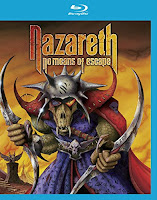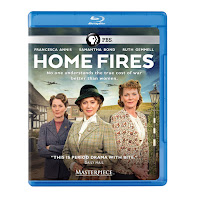- Details
-
Parent Category: Film and the Arts
-
Category: Reviews
-
Published on Wednesday, 11 November 2015 00:13
-
Written by Kevin Filipski
A.D.—The Bible Continues
(Fox)
With their sequel to The Bible, which proceeded from the Creation to the aftermath of Christ's resurrection, Roma Downey and Mark Burnett produce another multi-part mini-series, now starting with Jesus's crucifixion to the apostles' martyrdom.
The exceptional production values don't fully compensate for the mixed bag of actors, which runs the gamut from scenery-chewers to stiff zombies. A.D. makes an unpersuasive case for reviving sword-and-sandals spectaculars, even wasting such veterans as Greta Scacchi and Joanne Whalley. The hi-def transfer is spectacular; extras are several featurettes.
(Magnolia)
A televised meeting of the minds came during the 1968 presidential campaign when Gore Vidal and Bill Buckley—liberal and conservative intellectuals, respectively—squared off for a series of convention debates which ended up degenerating into nasty name-calling.
Morgan Neville and Robert Gordon's engaging documentary shows it wasn't their best moment but still made for riveting television. In a breezy 90 minutes, their lengthy and estimable careers in politics, the arts and celebrity punditry are illustrated alongside plenty of invaluable archival footage, while talking heads from Dick Cavett to the late Christopher Hitchens give the measure of both men and their era. The film looks good on Blu; extras are a directors' interview and added interviews.
(Lionsgate)
David Foster Wallace, who killed himself in 2008, has become the Kurt Cobain of authors, a genius whose early death robbed the world of his insightful writing; this adaptation of David Lipsky's memoir about his time with Wallace for a Rolling Stone magazine profile plays into that narrative but also humanizes him, thanks to playwright Donald Margulies' smart, resonant script.
Jason Segal and Jesse Eisenberg effectively portray both Davids—Wallace and Lipsky, respectively—and director James Ponsoldt drolly peeks behind the myth's curtain to show the real man. The film has a superb hi-def transfer; extras are a commentary by Ponsoldt, Margulies and Segal; interview with composer Danny Elfman; making-of featurette; and deleted scenes.
The Marquise of O
(Film Movement Classics)
Director Eric Rohmer's 1984 Full Moon in Paris presents yet another of his scatterbrained heroines who juggles men before deciding whom to choose. As usual with Rohmer, it's excessively talky without being particularly insightful, and low-key without any particular subtlety. Most interesting is an early appearance by that fine actor Fabrice Luchini.
By contrast, Rohmer's 1976 The Marquise of O, a German-language adaptation of Heinrich von Kleist's classic short story, is a winner in nearly every way, especially in its “stagebound” visuals and Edith Clever’s touching portrayal of the cluelessly pregnant heroine. Too bad Bruno Ganz is so disastrously uncharming as her insistent wooer: such great filmmaking doesn't need such a black hole at its center. Both movies look better than ever in new hi-def transfers; extras are archival interviews with actors and with Rohmer.
(PBS)
Even though there's a strong sense of deja vu in this six-part mini-series about women left behind during the early months of World War II in England—wives, widows, spinsters, all doing their part, as best they can, toward the war effort—the far stronger sense of place and showing how war affects so many different people in different ways is palpable.
Of course, the large and accomplished cast, led by Francesca Annis, Samantha Bond, Ruth Gemmell and Clare Calbraith, makes this impossible to look away from, even when one feels that one has already seen it, or at least something like it. The Blu-ray transfer is excellent.
(Deutsche Grammophon)
Rusalka
(Decca)
These Met Live in HD broadcasts start with Giuseppe Verdi's Macbeth, the least of his Shakespearean adaptations (Otello and Falstaff easily outclass this); but it has flavorful music, especially in Lady Macbeth's unsettling sleepwalking scene, performed here by the fearless Russian soprano Anna Netrebko as she does everything: grabbing it by the throat. She's the best thing in an otherwise proficient, uninspired staging.
Far better is Renee Fleming's signature role as the water nymph in Antonin Dvorak’s Rusalka, in which the most famous American soprano sings one of opera’s greatest hits, "Song of the Moon," in her lusciously creamy voice. Dvorak's beguiling and tuneful opera receives a stellar production. Both operas look and sound perfect in hi-def. Short backstage interviews are extras.
Toy Story That Time Forgot
(Disney/Pixar)
This latest Toy Story sequel might seem like a Disney money grab—it's only a 22-minute short that could easily have been an extra on a repackaging of the other films—but the short itself is funny and even poignant, and I enjoyed it cutting to the chase without an extra hour of often repetitive padding that the full-length movies abound in.
In any case, the gang's all here—the voices are Tom Hanks, Tim Allen, Don Rickles, etc.—for some throwaway fun. The film looks terrific on Blu; extras comprise featurettes, deleted scenes and a commentary.
A Borrowed Identity
(Strand)
In Eran Riklis's adaptation of Sayed Kashua's novel Dancing Arabs, the complicated relationships between Israeli Arabs and Jews are unsparingly shown through the eyes of Eyad, an Arab student attending a high-class Jerusalem high school who falls for the sweet Jewish girl Naomi.
Through the persuasive performances of Tawfeek Barhom and Daniel Kitsis as the teens, Riklis expertly charts a sometimes comic, sometime tragic trajectory of two young people who, whether they admit it or not, have the weight of their families' history on their backs.
A French Village—Complete 1st Season
(MHZ)
In the first season of this overstuffed but absorbing French TV drama, a small French village's denizens deal with their country's surrender and subsequent Nazi takeover: watching men, women and children resist, collaborate or—as often likely—do both as the Germans infiltrate their homes and very lives makes for 12 episodes of captivating can't-miss TV.
The rich and harmonious ensemble—led by the glorious Audrey Fleurot, who played an ambitious public defender in the great French serial Spiral, as the wife of the town's lone doctor and acting mayor—is flawless: equally memorable are Nade Dieu and Marie Kremer as women caught in the occupation’s many traps. Here's hoping MHz releases the next several seasons soon.
(Warner Archive)
Based on a French farce by Georges Feydeau, this desperate 1968 attempt to find frolicsome comedy amid slamming doors, misunderstandings and adulterous escapades doesn't provide much froth, despite comic veterans like Alec Guinness and Robert Morley and even glamorous Gina Lollobrigida, obviously game for much more than she's allowed to do.
It's too bad that director-producer Peter Glenville has taken lavish costumes, sets and a fool-proof plot and turns it into 98 minutes of franticness in search of laughs.
Maurice Ravel—Complete Piano Works
(Honens)
Ravel—Piano Concertos
(Deutsche Grammophon)
Ravel—L'Enfant et les sortilèges/Shéhérazade
(Decca)
If any French composer embodied savoir faire, it was Maurice Ravel (1875-1937), whose elegant, civilized music can be heard in all its glory on three enchanting new recordings. On his two-disc traversal of Ravel's solo piano works, German pianist Hinrich Alpers plays with scrupulous restraint while giving these mostly short but still major works the breathing room they deserve, from the exquisite set of tone poems, Miroirs, to the lively Valses nobles et sentimentales. As a bonus, Alpers fleetly performs memorial works by Ravel contemporaries Casella and Honegger, along with four newly commissioned ones by current composers.
Ravel's two dazzling piano concertos are given buoyant readings by soloist Yuja Wang, with Lionel Bringuier conducting the Tonhalle-Orchester Zurich. Alongside Ravel’s masterpieces, Wang plays the F sharp major Ballade by Ravel's teacher Gabriel Fauré, which has the elegance of his pupil’s music as well as its refinement, which Wang's illuminating interpretation brings to the fore.

Maestro Seiji Ozawa, who recently turned 80, leads the Saito Kinen Orchestra in very fine renditions of two wonderful Ravel works: the one-act opera
L'Enfant et les Sortilèges and orchestral song cycle
Shéhérazade. Ozawa's affection for the composer is never in doubt, but it's his main singers who are most impressive: Susan Graham catches the exotic nuances of
Shéhérazade, while Isabel Leonard—a guarantee of quality whatever she sings—makes an irresistible child in
L'Enfant.
(Albany Records)
An occasionally playful and intelligent opera about Gertrude Stein, Ricky Ian Gordon’s 27 floats along well enough, but only infrequently catches in its music the culture shock that stamped Stein's Paris and the artists in her circle.
Stephanie Blythe makes a grand Gertrude and Elizabeth Futral a beautiful-sounding Alice B. Toklas, Stein's long-time partner: Alice's aria after Gertrude's death is the musical highlight. Michael Christie crisply conducts members of the St. Louis Symphony in this world premiere; too bad there’s no DVD or Blu-ray to highlight what looks like, from the CD booklet photos, 27's far from negligible visual component.



 Maestro Seiji Ozawa, who recently turned 80, leads the Saito Kinen Orchestra in very fine renditions of two wonderful Ravel works: the one-act opera L'Enfant et les Sortilèges and orchestral song cycle Shéhérazade. Ozawa's affection for the composer is never in doubt, but it's his main singers who are most impressive: Susan Graham catches the exotic nuances of Shéhérazade, while Isabel Leonard—a guarantee of quality whatever she sings—makes an irresistible child in L'Enfant.
Maestro Seiji Ozawa, who recently turned 80, leads the Saito Kinen Orchestra in very fine renditions of two wonderful Ravel works: the one-act opera L'Enfant et les Sortilèges and orchestral song cycle Shéhérazade. Ozawa's affection for the composer is never in doubt, but it's his main singers who are most impressive: Susan Graham catches the exotic nuances of Shéhérazade, while Isabel Leonard—a guarantee of quality whatever she sings—makes an irresistible child in L'Enfant.

































